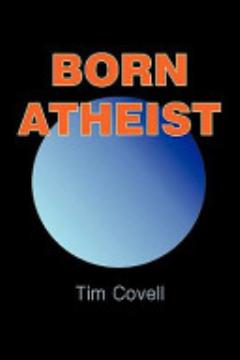The term "born atheist" is not new, but it is used increasingly by today's atheist activists. Tim Covell has chosen "Born Atheist" as the title of his new book.
"On one hand," Covell explains, "the phrase 'born atheist' is fun because it enrages religionists who would want to deny the truth of the statement. However, 'atheist' means without deities, so the argument can be won simply by pulling out a dictionary."
"But on the other hand," Covell continues, "'born atheist' includes the concept that atheism is a natural state and religion is a social virus. To some degree," he claims, "the term refers to a world view that is broader than religion. Atheism existed before religion and will continue after religion fades."
Covell relates that he wrote his book out of frustration with popular texts that require an advanced degree to understand. Covell says he would like to be the Michael Moore of atheism. He points out that thousands of journalists wrote about the 9/11 attacks, but it took Moore's common sense to ask for the videotape of George W. Bush's blank reaction to the news that the nation was under attack that Moore used so effectively in Fahrenheit 9/11. Covell attempts to bring the same down-to-earth style and common sense approach to atheism. For example, he obtains federal statistics to show that atheists appear in prison at 1/20th of the expected rate. He demonstrates that the rates of crime are significantly higher in religious states. Similarly, raising the question of whether religion is bad for your health, he shows that the most religious states are also the most obese.
Covell spends considerable time analyzing problems with religion. He builds incrementally, starting with small "miracles" like the image of Jesus on a tortilla, and building to more serious matters such as religion's harmful prejudices against women and gays. He ends his analysis with a look at murders committed in the name of religion and the potential danger of religious end time myths.
In exploring how religion is used to justify illegal acts such as the 9/11 attacks, Covell coins the term "superlegal," to refer to supernaturally justified illegal acts and points to the dangers of religious scriptures bringing ancient tribalism into the modern world. "For example," Covell says, "the Christian and Muslim scriptures condemn non-believers to an eternity in hell. This makes it easier for religious zealots to kill "others," since the believers think the others will spend eternity in hell, killing them now only gives them a little head start. These beliefs are particularly dangerous in the today's world," Covell says, "when modern weapons can be used to bring about mass destruction."
Covell concludes by suggesting that atheists learn from the gay rights movement about how to organize and pursue their agenda. He suggests action steps atheists may wish to consider, but concludes that atheism is a rising tide that will wash away the stain of religion.

